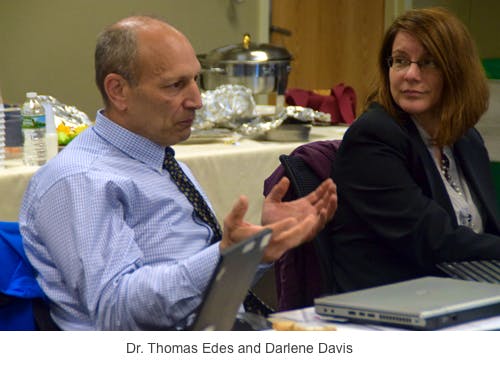URMC, VA Collaboration Seeks to Improve At-Home Veteran Care
By Nora Williamson
Tuesday, May 10, 2016
Researchers from the University of Rochester Medical Center recently welcomed administrators, researchers, and clinicians from the Department of Veterans Affairs (VA) for a two-day research meeting at the UR School of Nursing to discuss ways to improve home-based care for veterans.
The collaboration focused on reviewing progress and planning for the remaining two years of the study, “Heroes@Home: Factors Associated with Institutional Use by Veterans in Home Based Primary Care,” led by Tobie Olsan, PhD, RN, CNL, FNAP, professor of clinical nursing at the UR School of Nursing and a VA research health science specialist.
The Home Based Primary Care (HBPC) program is a vital component of VA’s strategy to shift care from institutional to home and community care settings. Along with comprehensive primary care delivered in veterans’ homes by an interdisciplinary team, HBPC focuses on maximizing veterans’ independence, function, and quality of life.
The program began in the early 1970s and has served a growing number of veterans – 34,000 daily in 2014, up from 7,000 in 2000. But there are more veterans who could take advantage of these at-home services, especially as growing older populations require complex types of care.
Olsan’s study, backed by a collaborative 10-member team of investigators from the UR School of Nursing, the URMC Departments of Public Health Sciences and Biostatistics and Computational Biology, and VA centers in Canandaigua, Denver, Miami and Philadelphia, is designed to identify organizational characteristics and team-based best practices across HBPC programs to help support veterans at home and to most effectively and appropriately use institutional care services. It will describe the characteristics of HBPC programs in terms of the primary care model, staffing, leadership, veteran populations served, and use of home telehealth technology and examine HBPC interdisciplinary team effectiveness in communication, coordination, conflict management, and team cohesion.
 “This study will contribute new information about how the highly regarded HBPC program can achieve even higher levels of quality and ultimately best serve our veterans in their own homes,” Olsan said.
“This study will contribute new information about how the highly regarded HBPC program can achieve even higher levels of quality and ultimately best serve our veterans in their own homes,” Olsan said.
It builds on the previous research conducted by Thomas Edes, MD, executive director of geriatrics and extended care operations for VA , and Bruce Kinosian, MD, staff physician with the HBPC out of the Philadelphia VA Medical Center, and is funded by VA’s Health Services Research and Development Service.
“This study is timely and urgently needed,” said Edes. “It’s the type of research we need to meet VA’s transformative strategic plan to shape the future of health care not only for veterans, but for all Americans.
“Changes in structures, services, communication, and information systems are integral to HBPC keeping pace with the changing needs of the growing numbers of veterans with multiple complex chronic disabling diseases.”

